

olio: Redhanded
Fall 2005



olio: Redhanded
Fall 2005
Poetry lives in our minds. Our memories paint it at moments when a sight, a sound, a smell provokes the feeling, reminds the memory of a verse.
Poetry lives in our hearts. When we are loved, our pulses beat the rhythm of love poems: Shakespeare, Browning, Smith. But poems pierce pain precisely.
Poetry lives in our hands. When we plant a rose, pick a rose, caress a rose. Pluck the petals, falling down pieces of prose.
Poetry lives in our eyes. When the rain falls, and thunder and lightning argue and cold winds dance wildly with trees, and poetry slips from our eyes.
Poetry lives in our lives. We live in the poetry. We are the poetry. We lament, cry and sing it. We breathe it and drink it. Poetry lives in everything.
—Julie Rebecca ThorupThe sun fires longer this season, on this congested nomad. Nonetheless, within this vessel I manage to discover you. I feel an abrupt eternal feathering, as you capture my heart with your vigorous remanence. I continue to approach you, we are wedded in gaze; the violent thumping quietly recedes, as does time.
Built before me a mirror world, eliciting my attention, with your ice-polished eyes, you awaken certain significant urges of my real physical world.
Embraced we fall, breaking air. Ultimately, we come level with solid ground. The entire room shifts, as the world dissolves behind us. We are forgotten by the universe, belonging to no one. It seems as though we are born in her, reared in her for ages. Constituting a solemn violation, we have sinned against the harmony of the sea.
Amid our fever of domination, relief rises from our ample silence. Your weary body trembles next to mine. Amazingly your heavy breathing down my neck reassures your sweet existence.
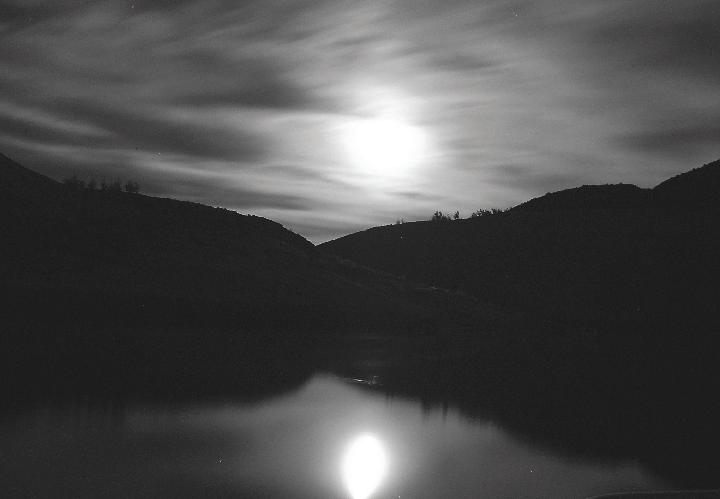

As I sorely study your quaint nature, I effortlessly fraternize all conflicting conceptions. Confined with fascination, my hands dance up your peculiar skin, through your delicate hair; I take in the extraordinary wonder before me. Complete and absolute. The way I see your integrity as a reference point for our own evolving identities, I see my perfect entity. There is no discomforting distance between us now.
I should have considered the offset of this dark rising tide. Indeed I am the bleeding butterfly chaser, the eloquent bohemian. I had put up with these prolonged days until your brutal honesty declared the beginning of this foreseen quake. I reminisce our rejoiced daytrips, which have now become hardened memories.
When a thousand of your tears had touched my face, I began to feel the entire world turning to listen; quickly I cowered to my absent state. I knew you would break me. I will not break this reflecting emotion. I belong to the ever-dying number of oppressed sentiments, because I have become aware that a fiction is no match for this bleeding bohemian.
Pour me a glass of your absence! The intoxication aggravates inside me. I realize I am poorly impressed by his absent aggregates. I continue to smooth out wrinkles on my contorted face.
The sole function of this impounded heart incessantly deteriorates replying to the sinking ecstasy. But just then, at that very moment in my utmost miserable climaxed weakness, its hazed meaning becomes evident, through bloodshot eyes:
As hard as she aches to hold her beautiful Jupiter love, she is beaten, starved with desolation. His longed fame and relatively all glory crowded out at his end, an end of such boiling fury. She’ll triumphantly crawl on to reconstruct the new day. Sleep to escape him…I love you (whisper)...now.
Hang up.
Smoke the icy night.
The moment is gone.
—Kori Moravec-Flores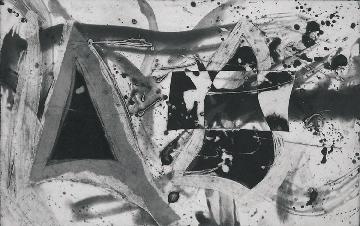
Calling all things to an end
Slowly: Breaking, cracking, grinding
As a silent night thief
Unaware of his slow progress
He is always among you
Decaying, deconstructing Dancing to the constant beat of time
But you will never see him
Under your present, scrupulous eye Stealing one scoop after another, Taking one bite, then a few more
In a bleak and invisible pantomime You will feel his work someday
Added upon your back:
Slumped over, with wrinkles
And frail bones; time’s sum
Then Death, that final game
—Adam HaverThe dog led the way. Dave walked in ribald indifference of his surroundings. Events ricocheted, flashing like fleeting, blinding lights incoherently in his brain.
The evening copper was setting angry on his dry eyes. The mountain was bleeding a rusted red that flourished in the leaves of its lower aspens. He shut his chafed lids, letting himself walk in the sleepless wake that blends daydreaming with the shiftless world. He marched drunk and with satisfaction. David finally felt like he was doing something. He knew that after an hour he would regret everything. The walk, the daze revisited, the inspiration lost. He knew that too soon he would be tired, lost in a range of mountains that he knew very little about, even though he had grown up under their shadows and silhouettes.
“Gray.” A cough: almost. The mountains were a simple gray in the transitional moments. Steadily, they, cobalt blue in the winter mornings. Lately, they were auburn in the autumn afternoons. Nocturnally, they were live transpositions of dying fireflies and blinking satellites, while other nights they alternated into a connected blackness with the sky on moonless evenings.
The dog looked at him, in boredom of him. The leash was entirely too tight to leave David for enjoyment, but loose enough to stiffly wander. The dog sniffed a patch of elusive bluebells, met a bee in a curious gaze and then barked, looking back at David for reaction.
His man was dressed causally, if there is a thing in the space that separates the city limits. His tie was loosened briskly from an urge, his black slacks were already dusted in tan patches, and his blue shirt was still buttoned except for one un-tacked niche.
Her words were rearranging in his mind to find meaning. Take the dog for a walk. The mountains were a walk for any animal. The dog barked at the air. Saying things in an impeded march up the canyon, speaking in a base refrain.
The bitch, a bastard breed of old Chow and Coyote lines, hung her tongue out resembling a dawning, purple sky set on the back of snow-caked mountains. She barked freely at the bee impeding her sniffling. She barked again, then ate it, then chomped at her own tongue and receded into coughing. David slapped the dog in an attempt to help it.
“Quit coughing,” he commanded. Provoked, it only coughed more, squinting sympathetically with whatever the man was trying to accomplish. It knew that if it was beaten, that somehow the man was trying to cease pain in itself, even if he only perpetuated more pain.
“Quit that shit!” The man started in a downward squat to choke the mutt.
“Awrr!” The dog’s drawl was cut short by a sharp bite.
David’s withdrawal was immediate, subtle and angry.
“Come on now girl, you’re making this easier.”
Eva, whose eyes shut half in pain, continued to bite her tongue in angst, her black eyes set on him, gnawing painfully at her anima speech.
A walk, in the mountains, the breeze at his back.
“You done?” he grumbled.
The dog’s teeth pulsated in a docile beat while her tongue bulged between the naturally shaped enamel.
“You’d be better to have just kept yelping.”
They locked eyes long enough for David to nudge the dog forward for conformability’s sake. David’s view shifted towards the unseen city, it was probably refracting the lights of dawn back onto its clouded ascent. The basin sunk into itself, the mountains rose along the banks of sudden bases that remounted in fierce peaks, rising then revisiting itself in an endless scope of sightless slopes. The entire basin was made up this way, and so were the lives it shaped.
“Keep climbing!” David’s force came more amicable then he had hoped and he stopped to regroup his resolve. His mental concentration created a laxity in his hands. The retracting strap tightened, loosened, then made a final strike that flung the leash from his hand.
The dog barked at David, then at its freedom, then at itself. There was a brief moment of uncertainty, then a bolt of action.
He wanted to scream ruefully at the dog but the only words that came out were, “Who the hell blames you!”
“Arrrrwffff.” The dog erupted in a short bay of retort.
“Possibly.” But David didn’t believe himself. The dog trotted and diverged to a patch of wild grass where a loosely based clan of field mice were chattering at each other.
“This is all she said…” The loss strained down his throat like transcribed words he took from her and made his own. “Listen, closely…”
The dog brought back a blood-matted mouse that she coughed up at David’s feet.
“This inbred, regurgitated mouse…that’s what you bring back to me?” David said of the tribute before him.
“Bring me back a mongoose, a…are you listening to me?…Bring me back something smooth, a mink skin, a beaver pelt…Shit….”
The dog stared at him in a triumphant pose and let her eyes land on David’s shaking eyes. The panting brought David to a transit reality about his place.
“If you understand, then I’ll…bring you home—you’ll be a gift.”
David threw wrested swings at the dog and supplanted him in a volatile press against his haunches. The dog tugged himself free and then brooded over her master’s cursing voice. She then spent herself leaping, turning in halfpikes on overturned pine logs. The repeated routine seemed stagnant, repeated anew, yet placid in the crisp air. Somehow it was a game.
The sun transposed itself on the western sky, the clouds acted as underdeveloped skin, her face blotted fuchsia while her underbelly was painted brass.
David contented himself to watching the dog in self-pity.
“Dog, life is a simple thing, you’re told…you are told that if you…god damn it, dog, dog? Where the fuck are you?”
The dog bolted back, fresh with a musky scent. The man stood chastising the dog in vocal redundancy. The words were bitterly repeated, the vast majority of them futile, though there were some of them that struck a chord of resonance with the beast.
The man stood chastising the dog in vocal redundancy.
“Where are you going…Don’t do that…that—just don’t get lost.”
She knew that they were familiar but she continued on her prance across the breaking meadow’s branch-strewn opening. Leaping for imaginary game.
David remembered the meadows that opened suddenly in these elevated plains of the mountains. He used to camp in them frequently, surrounded by others who seemed much the same as him. In those gatherings, the movement of the world—its sounds, scenery and life shaped the mood of the evenings.
At parties in the city, like loose sage tangled together on the salt flats of the lower basins: lies—if you could call them that—rustled in the wind of neighborhood backyards. Lies leaned up against each other because, without each other, they would arbitrarily drift away in a meaningless tumble at the will of some warm, southern wind. Lies and sage needed crowds and multiplicity as foundation to call a place home.
David would lead girls inside unfamiliar houses. Once inside, he preferred to tell women at these parties that what was being exchanged was not lies, but an agreed upon truth, coherent as the people that believed them. He recited, over and over, that some of the things being said were hopes or unfulfilled wishes, to others they were postponed eventualities, and yet to others they were nothing more than atmosphere for the room that they occupied. A feral, contagious ambiance. You could change a room in this way like you couldn’t change a meadow. Indoors—inside—you could morph control to suit preference. The reason that any preface was even necessary at the beginning
of any conversation was to define the actions that individuals would inhabit later. Words were for the sake of definition, relating the lack of limitations of whoever they would pretend to be possessed by later and how they would be expected to behave. Words were there to shed culpability. If you tried to do this in the wilderness, your words were always contradicted by your actions. Any speech about your ambitions of seeking vocational steadiness as a bounty hunter for rent money was immediately checked by your constant, panicked attention to what maybe was a snipe running through a thicket or a starved mountain lion poised for pouncing.
David listened to some rustling in the underbrush and began talking to it. “Listen…my grandfather walked hills like this where he grew up.” He began to ramble. “On the lower plains of the Snowy Range, that’s in Wyoming, dog. He lived in a suffocating tent with nine other children, which would, God willing, turn into a tarp when it wasn’t steadily snowing nine months out of the year. His mother died when he was seven and his father was as good a drunk as his ability to obtain whiskey allowed him to be. This was plenty, considering drinking became his preference for passing time over childrearing after the death of his wife. While his father used whiskey to wilt time’s flower, and before he was old enough to afford the habit, my grandfather used to walk the crowded coppices of Spruce and Alder in hopes of catching game. There were a lot of things he would try to catch out there, teamed with his only brother. The bigger game that they would hunt when they could afford rifles were Mule and White-tail deer; in autumn they changed to point bucks of elk. The avian game of grouse, quail, doves and wild turkeys fit their palettes after they could afford shotguns. But guns came in much later in their lives, towards the end of their summer years. During their formulated spring years, around ten to fourteen, they lived off catching antelope by hand.”
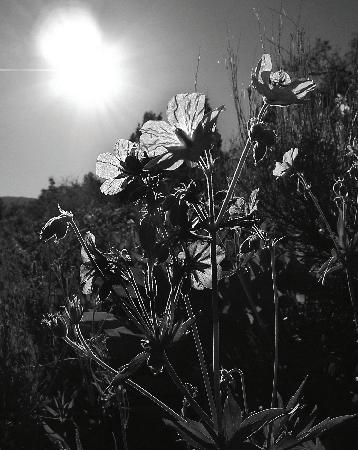

He thought about the ending argument, the list of all the things she wanted in a man, all the things he wasn’t.
David licked his cracked lips for moisture. “They would wait in the lower, wagon-wheeled branches of the spruces that closed the creeks from the open plains. Like silent students they would watch, with their untanged, pocket-knife hilts grasped tightly in their fists, practicing shaving themselves in nervous twitches with the dull side of the blades. They would talk of boredom, life and family with the intricacies of their eyes, separate in their own trees to widen their chances of capture. When an antelope did come along from underneath him, my grandfather would leap from the tree like the native wildcats he had watched, and he would try to imitate their timed descent around the neck of the beast. In successful times he managed to catch the throat of the antelope in the trachea which he would continually puncture until the thing was too tired to let him ride along side it. When it would fall, his brother would jump down from his perch and begin to skin the thing the way children do things to alleviate boredom. They cut patches of fur off of its legs and watched the reaction. When they grew bored again they would start taking off appendages: slicing off ears, cutting the beast androgynous, leaving only bloody slits, keeping them to tease their younger sisters upon their return. Finally the thing would die and they would morph into earnest providers and carry the meat home, skin the useful fur and cut the bloody rest into stewable and braiseable strips.”
David sat himself up against the edge of sandstone ledge. He thought about the girl that just broke up with him. He thought about the ending argument, the list of all the things she wanted in a man, all the things he wasn’t.
The dog burst forward out of the brush and circled in front of him. He had asked her if she wanted the dog to which she said, no, and that if he didn’t want it he should be a man and just take it for a walk. She probably meant to a humane shelter, but he had taken her evoking threat literally and ended up here, trying to change himself into the person she created in his mind. It was now, out here, where he knew that kind of transition wasn’t going to take place in him. He had been bred into a different kind of man, prone to visiting these places, but one who could never successfully make them his home. His trip out here had been an idle threat, nothing more.
He thought about the game that the dog was hunting instinctively: mice, woodchucks and squirrels. Things that would run up trees to escape the mutt. Everything out here had a plan to maneuver out of the sudden threats of life, everything was comfortable sleeping in a mountain bed, living uncertainly.
He got up and kicked the edge of the sandstone in frustration. He cursed loudly and listened to himself echo in the canyon. Then, the dog tilted it’s head and lifted its tail and ears. They watched the edge of the forest and both began to hear a loud successive rattle that they couldn’t place. David shuffled his feet, circling, trying to locate its origin. The dog stood poised, and a huge fusion of lime and sandstone landed heavily onto the dog. It sent a shrill yelp as the boulder pinned it against two heavy pines. It cried, panting for fleeting air in gasping, gurgling pain.
David jumped towards the dog to try to free it from its impossible struggle. Its hind haunches were completely crushed and pinned. Its loose, lower ribs were pulverized and it bled profusely from its muzzle. Time slowed. A hummingbird hovered above David’s face for what seemed like minute. He tried to push the boulder but fell forward with his momentum and knocked his teeth against the rim of the rock. He shuffled to his feet quickly and spit a loogie of blood and saliva onto his pants. He kicked the rock to loosen it but only succeeded in spraining his ankle as his foot brushed uselessly off the exterior of the stone.
After a minute he was fatigued and resigned himself to lying next to the dog, trying to comfort it in its final moments. He sat with his ankles folded underneath himself and placed the dog’s head in his lap. He moved its body too much in the process and the dog made a snap at him to let him know.
“I’m sorry, sorry!” He comforted it in a low tone and the dog laid her head in his lap. The man brushed the dog’s face with his fingertips and wept sullenly in pity. He told the dog stories about itself. They included near death encounters with chocolate, the time it tried to choke itself out of its collar by jumping a fence with too short a leash, and the ultimate success of the venture. He reminisced about the fight that had led up to this event, and apologized repeatedly.
The dog died within the hour and the man didn’t try to dislodge the beast which lay half hidden it its sarcophagus. It was frozen, dog stuck lifeless between two worlds. David felt dead along with his pet. He walked dazedly, and barely in a dead shuffle. He reached and walked across a pond, whose fatted wharf tangled at his feet as if trying to keep him permanently there. He broke their loose bonds and continued to make his way, unknowingly, to his car.
He told the dog stories about itself. They included near death encounters with chocolate.
He would go back into the city, bloodstained and in shock, where he would tell different accounts of the event to different people. He would tell his friends a story about his unforeseeable loss as he drank his pain away on their liquor, on their couches. He would tell his mother about losing his best friend in the hills of some backwards country he didn’t understand. He would pass the time living off the sympathy that comforts a survivor and, in time, he believed that he might actually become a victim if he told enough versions of the story. But first, before he could heal himself, he would go to relieve some of the blame and necessarily hurt someone else. So when he reached the city, he made a direct path to his girlfriend’s house, soaked red at the foot of her doorstep to tell her he had taken the dog for a walk.
—Tyler Simpson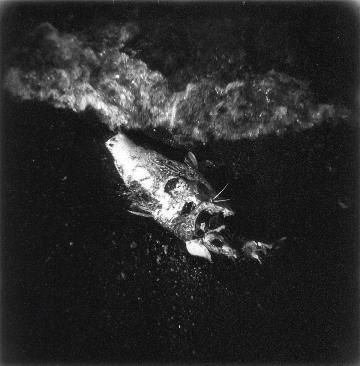

It was only recently that I have become familiar with the play Richard III; however, it wasn’t long before Shakespeare’s Anne gained the majority of my attention. Anne’s actions and the reasoning behind her actions perplexed me, and soon my mind became wholly consumed with developing ideas that could possibly be the motivation behind Anne’s choices. There are two major events in the play that cause me to question Lady Anne: the first is her acceptance of Richard’s proposal. The second is the fact that she chose to stay with him once she discovered how evil and murderous Richard was (even though she would probably be killed before his outrageous tyranny was over). The best way I could think of to investigate the possible answers to my questions was to attempt to get into Anne’s head, taking in all that had gone on around her and all she had yet to face. It occurred to me that a journal is the most logical place for a person to lay out all that has happened in her life and examine the feelings that accompany each event. The following is my own version of what Lady Anne’s Journal might have contained, exploring potential answers to my own questions.
February 17
Today was as bleak as the cold and colorless winter that has preceded it. It brought one unwelcoming event after another. Not only has my husband been killed, but also his father. The Lancaster family has been the sorry loser of this never-ending civil war. I am left here, in a land that I was once wholeheartedly welcome in, and I am now entirely unwelcome. I have nowhere to go, no family, no way to get food and nowhere to live. I am lost in sadness and do not know if I can ever stop mourning my dear husband. He was to be king, and what a wonderful king he would have been. Today I shall walk through the streets, next to my dead husband, grieving what was and what could have been. I will hold my head up high and I will not show my fear or the panic that has consumed my soul. My heart aches and I am void of any feeling, but I will get through this and I will somehow survive.
—Anne
February 18
The most hideous thing has happened, yet I cannot help but think that it has saved my very life. As I was walking alongside my husband’s coffin, the very man who murdered my dear Edward approached me. He complimented me
I did not accept, but I did not refuse him either.
and flirted shamelessly, but all I wanted was to stab a knife through his black heart. He praised my gentleness and beauty, but I returned his compliments with spite. Richard gave me his sword and knelt before me, telling me to kill him if I truly hated him so. I wanted to kill him, with everything I had left inside me but his unexpected words stopped me from doing what I longed to do. He told me that it was my beauty that drove him to kill Edward and King Henry, and while I cursed him outwardly, a part of me felt relieved that I may have found a solution to my predicament. I lowered the sword as the possibility of using Richard as an ally swirled through my mind. If I tolerated him, I might be saved. I would have somewhere to go and a way to stay alive. It was while I was pondering these things that Richard slipped a ring onto my finger. I did not accept, but I did not refuse him either. I do not want to be his wife; however, I see no other answer to my problems. It is done then. I simply must accept. It is all I can do if I want to continue my life in any form of comfort and safety.
—Anne
March 3
I have done it. Richard is my husband. Since the deed was done he no longer bestows upon me those lavish praises that were forever coming from his lips before we were married. He doesn’t treat me roughly as I have feared; in fact the result of our union is quite the opposite. He ignores me at all costs. He treats me like a plague of locusts and will not even lay in the same bed with me as a husband should. His behavior toward me is almost worse than if he shouted and roared at me. I cannot live the rest of my life unnoticed, although I suppose I may deserve no better for marrying the man who killed my only true love.
—Anne
March 22
All those who are now important to the crown are being murdered. Dear sweet Clarence, one of the only civilized people in this abhorrent castle, has been murdered in the tower. Lord Hastings and Queen Elizabeth’s kinsmen have also been killed. I cannot help but think that Richard is behind it all. I knew he was a greedy selfish man, but will he stop at nothing to become king?
—Anne
April 10
I cannot believe what has happened. Richard has finally succeeded in his pursuit of the crown, and yet that has not stopped his villainous deeds. He imprisoned the young princes in the tower and had them eradicated. My sorrow is deep, for who can imagine how evil a man must be to kill innocent children? I now know that there are no limits to Richard’s madness and I fear for my life, but if I leave, where will I go and how will I survive? I fear that I am dead whether I stay here with Richard or go out on my own. I no longer have any semblance of control over my own life. There is nothing left for me, but to wait to die, and what better way to die then by the hands of the man that killed the only husband I ever loved. I have betrayed my husband and now my husband will undoubtedly betray me.
—Anne
I realize that the previous journal entries are by no means the absolute answers to the questions that have weighed down on my mind since reading Richard III. However, I also realize that my questions can never be absolutely answered, only speculated upon. I have become content with the understanding that when a person is put in a situation where they feel threatened, helpless, and afraid; they will do just about anything to appease those feelings even if, in hindsight, their actions don’t seem logical. It is my conclusion, then, that Anne made the choices she did out of simple fear: a fear of the unknown and a fear that she would die if she were to venture out on her own. This fear, in my opinion, is why Anne chose to marry and stay married to Richard, who ironically was the cause of her death.
—Haylee Bradfield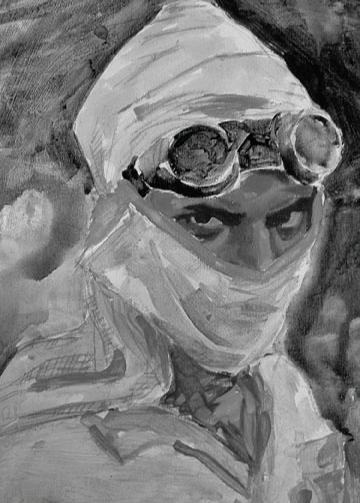
On the wide flat rock
The ants wander aimlessly Into each other.
—Julie Rebecca Thorup
How short it seems he was here, just a shimmer in my life. How quick my glance into his world just a shimmer of time. He always glowed with love, just a shimmer of himself. His smile was always glad to see me, just a shimmer of his friends. His life cut short, leaving us with just a shimmer of what had been. I’ll never forget his laugh, making us all laugh ’til none could breathe. He’s gone from life, but not my heart just a shimmer away.
—Naomi DombenWhen I am fat and you are thin: you tease me about my double chin.
When I am thin, and you are fat: don’t sit on me, you’ll smash me flat!
—Julie Rebecca Thorup
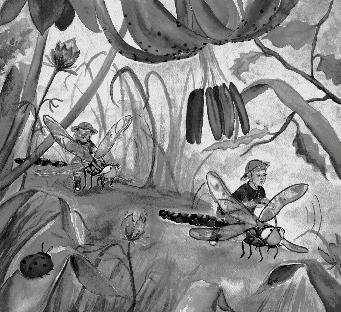
Never pretend to see your beauty silhouetted through a veil,
Streaking fire-dying sunsets flashed through faded years.
In lightning skies and thunderous lies, just a wise but forgotten tale.
In ages lost without a cost, just a final jest…
Show me glory echoed, fables out of fears.
Never intend to give to you my tarnished unseen trust, my dreamland burned before your eyes my secret torn to words. My silence spoken, ten-thousand lies my failing heart to dust, my sacred meadow, charred to ash… my iron will to rust.
And Never remain a little longer, a little more each day
Away with darkness and dazzling light, away with Mystery!
Never close my eyes, this shadowdance, this flickering candlelight, entrance me that I should see your beauty and your plight,
Remind me there’s a never-second chance.
—Joshua SilverI was raised in a concrete jungle
Where steel beasts prowled asphalt trails
And the trees all grew at ninety-degree angles
In a forest where the night was never dark
In canyons with walls of glass
I scrounged my morals from other people’s trash
I wandered forlorn, linoleum wastes
Abandoned fields of yellow lines
Crossed rivers of death ten lanes wide
Searching for my meaning
The things I’d seen, such violence!
The steel beasts would fall upon a person
And toss the mangled corpse for yards
After sucking out the soul
Many died cold and starving
And many more alone
Trapped in square caves filled with copper vines
Their cries for love swallowed by the gaping neon maw
Life oozed from the cracks and was pruned back
The people gathered in brick castles and spoke fifty languages at each other
Through filtered paper straws
Drank noxious potions while outside raged a perpetual storm
Of noise and heat and exhaust
The wilderness had a heartbeat
Measured out on the faces passing by
That said the wilderness was forever
And always had been, but the people soon would die
The rain came from the ground
The sun was smashed in a thousand pieces
Each one stuffed in a box
And the green things were caged on rectangular islands
Into this environment I was born and raised by this faceless god
Through this wilderness I wander looking for the mystic’s myth
Spilling my soul across tiled ceramic floors
Clawing at revolving doors, pushing all manner of buttons
—Justin Popa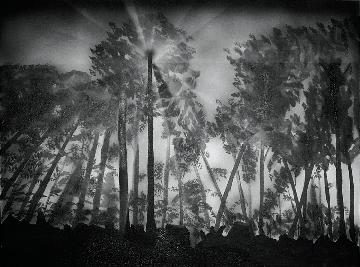
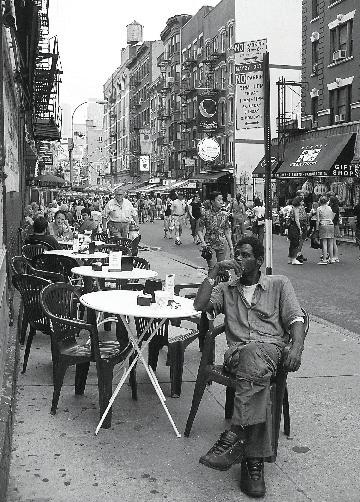
Wake up. Yawn. Scratch yourself. Shower. Put on your clothes. Drink coffee. Eat cereal. Brush Teeth. Go to work. Go home from work. Eat dinner. Watch TV. Masturbate. Go to sleep.
Wake up. Yawn. Etc., etc., etc.
This isn’t what you dreamt of when you were a kid.
A twenty-something carbon creature walking through life like a rerun of a bad sitcom.
Take the safer path in life, your parents said. Never get in trouble or think outside the box. Life is beautiful, and smell the flowers when you get a chance, they yodeled.
Forget what your parents told you about life. Life isn’t optimistic and full of roses. If you stop to smell the roses, some wolverine will rip the shit out of you and steal your wallet and your girlfriend.
Eat breakfast. Drink coffee. Do dishes. Shower. Hop on the Internet. Read something of no importance to your daily existence.
Routines are there for comfort, like a big mold someone made for you and told you, you can’t break the mold. To break it would mean you weren’t feeling well. You must be sick. You haven’t shaved in a day. You must be depressed.
If only life were like a View-Master. Then you would realize how worthless your life has been.
First picture: Snap! A cute baby! Look at all that short brown hair, those clear blue eyes and that chubby body! Your mother is cradling you! You have a cute little smile on your face! And there is your dad looking tired after working all day! What a cute family!
If you stop to smell the roses, some wolverine will rip the shit out of you and steal your wallet and your girlfriend.
Snap! Second picture. Riding your first bike! You’re wearing a ScoobyDoo shirt with those cute jeans and ET shoes! There is your bike, brand new for your birthday with training wheels! And there’s your dad, looking tired as always after slaving away at his job and working his ass off for his family! And
there’s Mom! She looks tired too, working at home, taking care of you and keeping the house tidy!
Snap! Third picture. Graduating High school! You look so handsome in your black gown and cap! Your braces are hardly noticeable! Look, there are all your friends you will never see again! Mom and Dad are looking proud as always: proud and old, but also sad. How strange…
It’s raining as she dumps ashes into the ocean.
Snap! Fourth picture. It’s an office! You look so happy with that suit on, sitting at your desk! All clean-shaven, hair done perfectly! There’s your computer, your calendar, and a picture of your beautiful girlfriend/boyfriend!
Snap! Fifth photo. Look, it’s you at your office again! But your hair is gray, and you don’t look so happy anymore. Your face isn’t quite as cleanshaven as before, and you have a bitter look on your face. A different girlfriend/ boyfriend’s photo sits in place. How many people have you slept with?
Snap! Sixth photo. You’re dead. There is your urn, full of ashes. Your daughter is holding the urn, your only child from a bad marriage. It’s raining as she dumps the ashes into the ocean. Tears stream down her cheeks as the crew of the boat looks on. No other family members, no cousins, no ex-wife. Your beautiful daughter is the only one who cares that you are dead.
You can return the View-Master to your local retailer with a receipt. Your life doesn’t come with a receipt. No warranty either. If it’s broken, you deal with it.
Damn, The Man ripped us off.
Get home from work. Vacuum floor. Clean bathroom. Watch TV. Masturbate to Internet porno. Go to sleep.
Get the drift yet?
Live doesn’t get better as you get older. It only gets worse until you die a bloated space monkey.
Sitting in my uncomfortable chair, hands spread against my keyboard, staring at the flickering lights of my monitor, I’m reminded of a line from my favorite movie.
“They’re all dead. They just don’t know it yet.” Hallelujah to that.
An e-mail pops up on my screen. It’s another customer with a question about his Internet service. I can sense his frustration even before I read the body of the e-mail. The subject of the e-mail is as follows:
“Your service sucks!”
Thank you Sir/Ma’am. I’ll let everyone know how important your thoughts are to my company.
Turns out, he was a teenager who couldn’t access pornography websites. His parents, moral and righteous in their cause to keep smut from their horny teenager, blocked his login from any adult material.
?—James ReynoldsIn
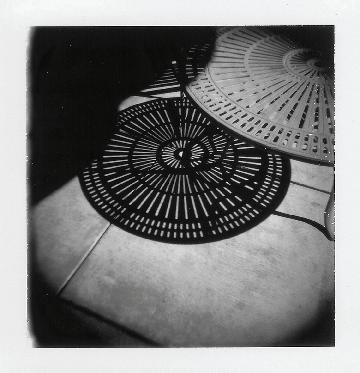
Of course, the e-mail doesn’t say that. You had to read between the lines to find that out.
“For some reason, I can’t get to certain web pages needed to do my homework. It’s your entire fault, because your parental blocking program thinks these are adult sites, but they aren’t! You need to fix this now, or else I’ll tell my parents to cancel your service!”
I almost felt like telling the kid how to get that porno. To download another browser that doesn’t use the parental blocking program. Or how to reinstall the parental blocking program so he can recreate his profile.
And everyone thought President Clinton had tough moral issues….
“Dear sir, I’m sorry to report that the only people who can change your user profile with the parental blocking program are your parents. If you feel that your Internet usage is being too heavily monitored, then speak with your Mother and Father about that. If you have any other questions feel free to ask.
Sincerely, Stanley Jenkins.
Technical Coordinator”
This was my life. Wasting away at that desk, wearing a white button up shirt (ironed with starch!), with generic Dockers pants and Payless dress shoes. I was the epitome of what it meant to be cheap, the poster boy for Ramen Noodles. I had better things to spend my money on than clothes for work.
“You have 1 new message,” my automatic e-mail program shouted. If only I could have shouted back. After hearing that voice, 60 times a day for 5 years you too would want to tell it to shut the hell up.
If you haven’t guessed yet, I work for a very prominent Internet Service Provider. My company sends out those annoying CD-ROM’s you get in the mail and throw away. Millions of wasted materials, all to let you know, “You can get 4500 minutes free! FUCK YEAH!”
I reached for the now lukewarm cup of stale so-called coffee from the so-called coffee machine they supplied for employees. Crude oil would have tasted better.
“Question about your service.”
I opened up the e-mail.
“I started noticing lots of dirty images appearing on my computer! I asked my son and daughter about them and they denied ever going to any dirty website. They said that your servers were sending the dirty pictures to them.
I want this stopped now. My family is not a home for your smutty material. If this type of action does not cease I will cancel your service and sue for subjecting pornographic material to minors.
Thank you, Mr. Smith”
I took a sip of the crude oil with sugar. I started to wonder if cars could run on this stuff. I could make a fortune. I could see the national headlines now (except for on Fox News): LOSER COMPUTER TECHNICIAN RUNS CAR ON COFFEE WITH SUGAR.
“Mr. Smith, first off our servers never send any pornographic material to anyone. Our service is known for keeping pornography out of the hands of people who do not want it. We merely provide you, our customer, with access to the web. What you do with it after we connect you there is up to you. You may want to check the History button to see which sites were accessed, and when. This will let you know who was on what website and even what time they were on it.
Sincerely,
Stanley Jenkins Technical Coordinator”That was a lie. My company had hundreds of porn sites attached to it. You just had to look in the right place. www.sleepwithme.com was one of the more popular ones.
One of my co-workers, a wormy guy named Chad walked over to say hello. I was pretty sure, after a year of Chad working here he hadn’t answered an e-mail yet. He was wormy, which was good enough to stay employed.
“Hey Stanley, how’s it going today,” He asked. I looked up from my screen, straight into those wormy brown eyes, that crew-cut hair. The cheap “Local Swap Meet” five-dollar polo shirt with the small logo ripped off the front. Even his glasses said to you “I’m a wormy guy! Love me!”
You see, Chad had issues. He once told me that when he was a kid he used to dream of being a fireman. When he was seven years old a fire wiped out his family while he was at a friend’s house for a slumber party. He remembered screaming at the top of his lungs for hours that he could have saved them.
“Not too bad Chad. Just the usual, ‘keep the porno away from my kids’ shit. You?”
“About the same. Last night Janice and I broke up,” he sort of half whispers.
Wormy had broken up with more women in a year than I had ever dated in my life. I always wondered how he got so many dates, being wormy and all.
I rolled my eyes, closed my eyelids and prepared to become invisible…
“What caused the breakup this time, Chad?”
“Well,” he starts up, “she wanted to go out that night and I told her blah blah blah…” I stopped listening the second he said “wanted.” I crawled back into a corner of my brain where I could see Wormy but I didn’t have to hear him anymore. I had entered Stasis.
“Yeah Chad that sucks,” I automatically spouted out when his lips stopped moving.
“Yeah. And next she blah blah.”
Stasis was being in Heaven. Stasis was winning the lottery, having the best sex with the partner(s) of your choice and eating the best damn Taco Bell taco all at once. Nothing existed around me while I was in Stasis.
Given the opportunity, Wormy could talk your ear off. He was like the damn bird your ex-roommate had that wouldn’t shut up. All day, “Squawk! Squawk!” You wanted to strangle the stupid bird, but you know you couldn’t because your psychotic roommate would explode.
I remember the day that roommate moved out. Best. Moment. Ever.
Super Bowl winners didn’t celebrate as much as I did.
I started thinking about that annoying bird while in Stasis. Chad’s head slowly turned into that bird’s head.
You know you are having a long day when you would rather have a conversation with a halfparrot man than Wormy.
You know you are having a long day when you would rather have a conversation with a half-parrot man than Wormy.
“So I told her how I felt, and she replied squawk squawk,” Wormy Parrot said.
Exiting stage left, my sanity.
“Chad, have you ever thought that maybe women don’t like you because of your birdlike head?” I dreamily asked.
Oops. Did I say that out loud? I flew out of Stasis. It felt like being sucked through a vacuum.
“What did you say?”
“It was nothing.”
“No, you said I have a birdlike head, didn’t you?”
How was I going to get myself out of this one? I could feel the slimy sweat start to cinch its way onto my brow. Think, Stanley, think!
“You have one new message,” blurted my e-mail program. I sighed with relief.
“Sorry Chad. We’ll talk later. Got to answer this e-mail,” I said emphatically. Wormy stood there for a second, mumbled something under his breath and left. I could feel his eyes still on me. Sigh…
Chad, the Wormy guy, hated me from that moment on.
I wearily opened up the e-mail. Subject read, “I don’t know nuthin’ bout compooters but I need y’all help.”
This person needed more help than I could have given him. Compooters???
“I been workin’ on this here compooter and I have been tryin’ to connect to ya’ll’s and nuthin’ happens. I put the CD in the CD-ROM, ran your install thingie and I still can’t connect to ya’ll’s. What’s goin’ on? Am I doin’ somethin’ wrong?
Help me!!
Billy
Joe Ray”This must be some sort of prank. Even hillbillies from the Ozarks wearing the latest in “Deliverance” attire know that “y’all” spoken spells out “you all,” or “you guys.”
Eight hours a day, 40 hours plus a week, 52 weeks a year (not including paid vacation time). More than one-half of your waking year spent answering e-mail, making stupid small talk with your fellow employees, your ass growing numb from sitting in that “900 dollar ergonomic, made to fit your body” chair, your stomach gurgling from the black crude your workplace calls coffee. I’m pretty sure in the grand scheme of things, this is not how God wanted you to live your life.
Even your medulla oblongata begins to grow anesthetized. Hook up that goofy gas straight to all the gray matter in my head Doc. I’m ready to go for life.
I looked up at the clock. 4:57. Time to head home to my routine existence.
Get home, wash dishes, chat online, eat dinner….
—Ryan Cottrell
Untitled
I will begin
Floating like a butterfly
High in the sky
Above and ahead
My mind wanders
With full intension of Imagination
It does not soothe me
When I begin
Not as much as I hoped
I’m still confused with Nowhere to float
Just above and ahead
Like a floating butterfly
Is this like death just before the end?
When you want to dream
But get emptiness instead?
Nothing in my mind
I am not necessarily awake
Unconsciousness? Stillness?
A voice echoes in my head
What do you think?
What do you think?
What do you think?
Stimulation—Is that what I need?
Floating like a butterfly
High over the sky
Above and ahead
The views stimulate my mind
While I look at the sights
So many things to create
With my imagination
I will begin.
—Shonda BucklandShe was particularly striking in her radiance. Statuesque, shiny auburn hair cascading upon her shoulders highlighted her petite frame against the shadows of dusk. Autumn noted her father and her pain in quiet conversation, staring into an endless cup of chamomile tea. Her secret, still hidden, from an ordinary passer-by entering the train platform. Imagine, the outskirts of the island commuting such a precious cargo. A beautiful, restless, defined young woman’s scars encased inside a cocoon of fear. Apparently, she moved unrecognized through the blindness of the naked eye.
“By the time you reach Manhattan, Autumn, the bustle of today’s business will almost rest to a quiet hush,” I said. Prior to her departure, she purchased a full set of Homeopathic remedies. Pulsatillia, a soothing medicine for her menses; Nux Vomica, the Chinese nut will be good for an unsettled stomach, air sickness, on her flight to Paris. Autumn’s photo shoot will take her to L’Arc de Triomphe for a haughty high fashion designer who carried Henri tags on his exuberantly priced rags. Haute Couture has a way of creating many possibilities when cloaked upon a delicate, definitive form of a model.
As she was exiting the healing center, pausing, tossing her thick, shiny auburn locks; she intuitively mentioned “by the way Archie Fire Lame Deer is conducting lodge tonight, at the Wellwyn.”
Without hesitation, Autumn disappeared, gracefully as a gazelle entering into a thick forest of trees. Her perfume lingered in the room, filling my senses and awareness, she is not a dream! My heart beat wildly. Did Autumn speak of the Holy Medicine chief who came upon my trail in dreamtime vision? I carried the sentence…Ana Taki Waloma, close within the chambers of my heart for so long. He is the one; he is the one to re-mind me of my true name. What gifts do I bring? My moon time is flowing heavy today. My thoughts scattered, centered, how can this be? The remembrance of the Lakota holding sacred the inipi sweat lodge is in the forefront of my thought.
How do I know this?
Women are to be in separate lodge, moon lodge. In quietude, in dreamtime, in vision someone inside, recalls this voice of recognition. Stay away, away from the men! I recall this time of honor. This sacred, separate time of the sisterhood. Remains in my heart of hearts. Oh hell! This is the 21st century! I must be with this holy medicine teacher! If Wankan Tanka wishes this woman to enter inside the lodge, my flow will stop! I pray.
In a blink of an eye in a moment of time, my prayers are answered. I telephone my babysitter for my three little ones. Crap! Not available. The door bell rings, no not the paperboy! I briskly jaunt to the door. It’s Ronnie!
“Hi! Wow! What a great surprise! How would you like to earn a couple of dollars?” Before Ronnie could answer, ungluing his eyeballs from the headlights, I grab my coat, kiss my babies, and take tobacco, sweet grass, sage and keys.
I start the ignition; this car surely is an Indian car. It stops when she wants to, no power, and then, sudden bursts of energy, like a mare heading straight toward a black stallion in a box canyon rearing his muscular hind quarters ready for love. She flies, I begin to sing. I am singing in a language I do not recall knowing. Familiar, very familiar. I meander onto a road; I swear a spirit guide is leading the way. I park my car; a fox. Hmmm illusion. I enter the building, Holocaust remembrance, God are they ever going to release those poor souls? Smoke, smoldering, sage MMMM. Sweet remembrance for me. I wait patiently. All is complete, done before, another time perhaps. Watching intently upon the medicine man and the people in the circle; I sit and wait. Archie’s eyes connect with mine. How many times have we met before? Ancient beliefs, memories flood slowly, deliberately, as the dry, drought cracked mud awaits its moisture to succumb to the gentle, strong, warm and torrid waters of monsoon. Remember me, he says without uttering a single word. Silence
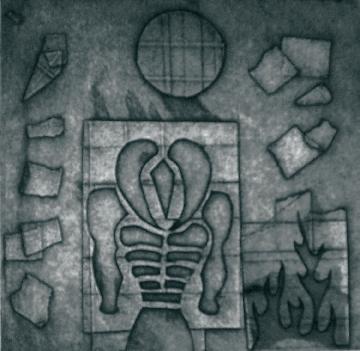
fills the room. Thick deafening silence, the kind which creates an internal stillness inside your soul. I am gasping for my breath. Ready to scream, where are we? The room shifts with its internal structure of width and dimension. I rise, shakily, to leave the room. I await his full presence without distraction, softly, the voices of women flocking to his side permeates the building. Some, perhaps, to gain a portion of his soul; others to become close to a native man. I chuckle to myself.
“Do they know of his medicine?” Trust and substance of his people stands before us. Archie leaves the room to attend to his bodily functions. Even a holy man has to use the bathroom. He stands before me. Archie, Tall, Tall, you are so very tall! A great cedar redwood, amongst the low-lying juniper of our nation you are. Wachichu, the white people. Oh, I say silently, I am so sorry for the atrocities my nation caused upon yours. Tears fill my eyes. He stands before me; I calm myself as best I can in the eye of the storm. I say “I
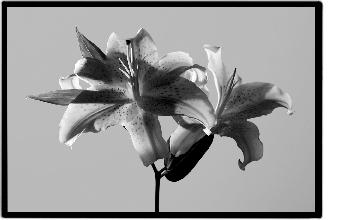
am told you can help me heal.”
Archie inhales deeply, closes his eyes and looks up. I feel my womb, my breath, all women, all men, all children’s souls circling inside his inhalation. Opening his eyes, he looks down upon my tear-streaked face, and says “Why?” I express my desire to heal myself, so I can be of assistance to others along my path.
“Healer heal thyself,” I state aloud. I gift him humbly with what I am told to bring. Archie smiles, accepts my gift and says, “Yes, I will help you heal.” I slowly run toward the door, outside. I take a leap into the cold air; raise my face and hands in exhilaration, scream “Yes! Thank you!” In this moment,
all remnants of time and civilization disappear. My senses are heightened; I sit, cross-legged position, and prepare my prayers.
The scents of the evening permeate my nostrils and awaken life in every portion of me. Small patches of cloth are gathered, blessings of tobacco, carefully create a necklace of intent. My physical flow of blood has completely stopped. The scent of smoke gathers my attention. I start my slow decline into the dark forest. Standing close to the sparks, ferocious flames, hiss of fire upon the grandmothers, I become tall. My eyes take on a trance-like glaze, overshadowing the modern woman of today. I transform into an elemental deity of light, peace, water, fire, earth, and air. I crawl inside the sacred lodge, to remind me I am nothing. Inside, the lodge feels warm, cold mud adheres to my toes. I have returned to my mother. I sit in the West, ah my bear; hot stones breathe and test my strength, my conviction to life.
Archie’s tears become the rivers, coursing, through the caverns of the West.
Steam enters the lodge, hot steam, hotter than a kettle, shouting its whistle through all time eternal it fills my lungs. Michaela, do not gasp! You will scorch your lungs.
“Have faith my child, Creator will not harm you. Become the steam.” Water vapor returns to creator’s breath.
“Ho Mitakuye Oyasin, all my relations!” Archie exclaims. The flap of the door opens. Prayers are released. I lived through the first door! Second round, door closes, Archie shares his truth of the loss of his mother. Archie’s earth mother, how he searched for her, barefoot in the snow. Father Creator has taken her. Taken from him, where did she go? Archie’s tears become the rivers, coursing, through the caverns of the West. His tears become all of the tears from all of the children, abandoned by the loss of the mothers. Through AIDS, famine, drought, no milk. Maka is your mother now. You now have your earth Mother to cry upon; to create the rain, rivers, and oceans of life. Man’s seed returning inside the woman’s womb to birth more children; children who recall the pain of the ancestors, to cocreate the medicine way. Make us remember!
A wing has brushed my face. Archie told me an owl would come. I felt its wing, as it flew. It flew to take away my pain, suffering, dis-ease, from me. The ancient One whose wings you can not hear. Hunter, huntress in the night, remover of deception. My healing has begun. Ah Ho!
—Michele A. BuchinskyA bold maiden won, from old arms to mine. Of my pain in field and life she did hear. Dark my color, made glow from white and fine, a place for weary fighter in her tear, in eyes so near just now my fortune found? Love, not like boat, can’t fill so full to sink.
My ear is pained, white dove’s lust may now wound. Know not what hearts may do, dark thoughts now think, A gift from mine own, made foul by strange hands, My sweet thoughts chased from mind by jealous dread, From sorrow and pain comes hateful plan. Alas, her last breath still can’t soothe my head, beware the green eyes when looking on love. They took from me mind, and more yet, my dove.
—Blake McGillis

It’s so natural; all things tend towards destruction. The dog thrashes in its cage, cuts itself on the bars, Hurls its body into greater pain, blind, blind of purpose. Seeking, finding only more suffering,
And seeking with redoubled resolve, enduring more sting, And finding only more pain!
It’s nature that confusion breeds anger;
“Why?” is acidic in nature,
Eating at whatever is doomed to the capacity to comprehend, Leaving rage in its all-encompassing wake.
The capacity to comprehend is the capacity to suffer—
To suffer the indignity of going unanswered,
The injustice of being ignored, And the consuming rage of insignificance.
It’s natural that we should hurt each other, that we should hate.
It comes so easily to a human being, lost and thrashing in the darkness, So easily! To create meaning of chaos, to find purpose in randomness.
To seize hold of another person and crush them, feel the structure give, Feel the tension dissipate, the relief, the joy of destruction, And revel in the meaninglessness.
Learning by imitation, so natural!
The beaten child tortures its playthings,
The shamed man demands “Why?” from the world—
And ignored, shouts “Is that what we are worth?”
Then turns about, burns his brother’s hut to the dirt, and rapes his wife.
So it is natural that the spears we stab our brothers with Are always tipped with “Why?”
And we fear most what we don’t understand.
—Justin Popa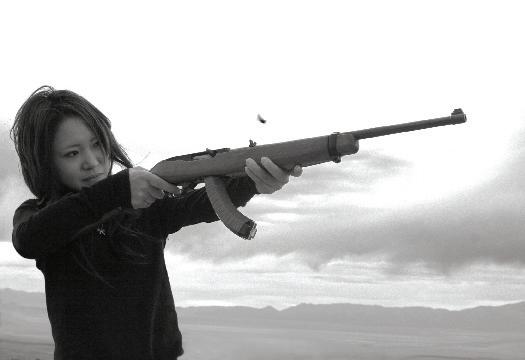
Kate Chopin’s writings and personal history suggest that “The Story of an Hour” is a study of oppression and the lack of freedom experienced by women living through the early feminist movement. Many of Chopin’s works offer women ideas and viewpoints that were not previously open for discussion. One particular issue, a key theme in “The Story of an Hour,” is freedom. The most common interpretation of “The Story of an Hour” by literary critics is the idea that any relationship built on sacrifice restrains individual freedom. Given what is known of Chopin’s personal views, this is almost certainly what she meant to convey. However, Chopin’s perception of freedom ignores the reality of familial relationships experienced by most readers. Arguably, Chopin misconstrues freedom, defining it as a thinly veiled form of selfishness. An alternative view of freedom, the ability to sacrifice for the good of the relationship, calls Chopin’s entire thesis into question, leaving one to wonder if Louise Mallard’s conception of freedom is as valid as Chopin would have us believe.
In order to live in harmony with another human, man or woman, we must bend a little, use give and take. This sacrifice is difficult. It causes arguments. Why should my ideas and desires ever take a back seat to the ideas and desires of another? As Louise states in the story, the “intention of the other party, kind or cruel, makes this bending of wills no less of a crime.” The idea of love, in particular, asks both men and women to sacrifice much of one’s self for the good of the other. Sacrifice, by definition, is giving away something desired with the hope that it is for the good of the soul, and the relationship. Louise desires to live for herself. She feels the need to live without sacrifice. Perhaps she entered her marriage with a different idea of what would be required of her, but her discovery that successful marriage entails giving up personal freedom certainly came as a great shock. Now, she is trapped in a relationship that, though loving, feels oppressive and forced. She admits to loving her husband—sometimes—and these feelings of love, coupled with the demands of a gender oppressive society, keep her locked into this relationship. She is willing to remain, in spite of the loss of her unshackled freedom, because she has mastered herself. She has the strength to live with the unintended consequences of her uninformed actions.
This strength is not inexhaustible. Sooner or later, Louise will be required to take stock of her life and choose between the husband that she sometimes loves and the lack of restraint that she desires. In a different environment, there is an example of the decision she must make. Trainers of horses feed their animals oats. Often, in a pinch, they can feed these thoroughbreds hay, and
the horses will eat it. However, if the trainer ever again gives the horse oats, it will resist eating hay from that time forth. Having compared the two meals, the horse will refuse what it views as the lesser offering.
Louise, while not a horse, is very much in the same situation. She once had the freedom she so desires. In an effort to search for happiness, she may have unintentionally given up this autonomy in marriage. She will eat her hay, if you will, but the desire for oats will remain.
During this very emotional “Hour,” Louise is again offered oats. She is told that her husband is killed at work. Though she mourns his loss, she quickly considers that this is her opportunity to “loose the reins” and live again without the sacrifices that she has been forced to make. She embraces the chance to live her dream deferred of a long happy life, devoid of concern for what others may wish of her. She is free!
The joy of the moment is still coursing through her veins, when unexpectedly her husband walks though the door. This time her strength, selfcontrol, and mastery of her surroundings are not enough. She will not give up her freshly sown oats. And this choice, made in the instant she sees her husband alive, is too much. She cannot abide his presence and she expires.
Despite Chopin’s presentation of the situation, one could view Louise’s search for freedom as very misguided. Is freedom really the opportunity to live without regard for the wishes of others? Tyrannical dictatorships have begun on this premise. Like Biblical Cain, who slays his righteous brother and then proclaims “I am free,” Louise does not desire freedom from some imagined oppressor; she wants an impediment to her selfishness removed.
Louise admits that her husband has never looked upon her with anything but love. He obviously provides for her needs, and she has a comfortable home. His employment that provides the material comfort is certainly a dangerous one, as there is very little question of the plausibility of his on-site demise. Yet he risks this danger so that she has no need to put herself into the work force. Today, this view may sound chauvinist, but when one considers the employment options of the average housewife at the turn of the century, it truly was a well-intended kindness. Was she to go to work washing dishes or cooking in a boarding house? Perhaps she could work in one of the infamous meat packing plants or one of the sweat-shop seamstress lines that were prevalent during the period. Of course work could always be found in a house of negotiable morality. The working conditions at any of these jobs
were far from ideal for human fulfillment. They certainly do not offer the type of uninhibited freedom Louise craves.
Instead, Brently Mallard risks his own life to provide comfort for her. He possesses “kind, tender hands” and Louise gives not one iota of evidence that he has ever asked for anything other than the pleasure of having her near him. In fact, the story states that he “had never looked save with love upon her.” Most likely, in the vein of many loving, caring husbands, he views her as his queen. Clearly, he would gladly sacrifice anything for her, as demonstrated by his dangerous job and loving disposition. Initially, Louise herself seems quite satisfied with her allotment in life.
When she feels this “subtle, elusive” feeling creeping toward her, trying to possess her, she fights it. In her heart, she knows that the feeling of freedom is false. It is a betrayal of the man who is devoted to her. It is Cain-like selfishness, not true freedom. Nevertheless, she gives in, allowing herself to trust the lie that is on her lips.

She speaks of a “powerful will bending hers in blind persistence, imposing private wills on fellow creatures,” but again, she offers no examples of her husband’s guilt on this matter. Indeed, it is only now, mere moments after learning of his passing, that she has convinced herself that this devoted spouse was little more than an overseer, cracking imaginary whips, and keeping her fragile self under his oppressive control.
What freedom has she gained with his death? Her employment prospects are even worse as a widow than as a married woman. Society would still look on her with the same indifference, only now the dismissal of her talents, capabilities, and desires will have the added shame of pity. Her independence has not increased at all.
Shortly after she sells her soul to the falsehood that separation from a devoted husband is really freedom, her innocent, caring provider walks through the door, unaware that he is thought dead. The guilt that Louise must feel at her betrayal was surely too much for her physically and metaphorically weak heart. She expires, thankfully before her husband can be shattered by her cruel betrayal.
In the end, the reader is left with an unresolved argument on the true nature of freedom. Is it the unrestrained right to do as we please, as Chopin argues, or is it the ability to sacrifice a small portion of independence in order to gain the greater freedom that only comes from a loving relationship between a man and a woman who would do anything to secure the happiness of the other? Is freedom strictly individual or does it require that we learn to cooperate with others for a greater idea? Sadly Chopin, despite her conviction, is only able to offer the questions for discussion, not offer conclusive answers. If she, or anyone else had the “right” answer, there would be much more satisfaction in writing philosophy than fiction.
—Patrick KellyIs it possible? Tell me how can there be a dancing cow?
It’s true! Look out the window now! See it’s there, through the glass, Prancing, dancing down the grass! Wait ’til you see my singing sow, She surely beats your dancing cow!
 Julie Rebecca Thorup
Julie Rebecca Thorup
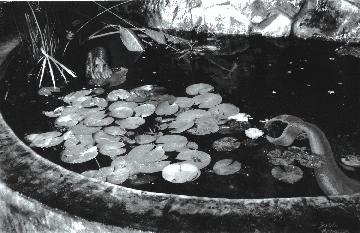
I once glimpsed a beautiful woman from a hidden spot
Of a frail frame, and a reserved and gentle touch
Of a soft and supple nature
Bathing naked in a stream
Inflamed by passion, I stepped forward to seize her
By wrist and slim ankle to heave her upon my shoulders and take her where I would
To claim this beauty as mine and never again find myself wanting or alone
Yet whatever my grip closed about grew tense and heavy
Became hateful and frightened
And as that beauty set flight beyond my reach, I loosed my hold in despair
Lo, the beauty returned!
The music of bittersweet laughter mocking my feeble, ineffective desires
My demands so insignificant beside such ethereal indifference
I once brushed up against the world, and grasped with greedy fingers at life
As it flowed by me
Grimly determined to beat some sense out of it
Caught hold of nothing and found an overwhelming mystery that laughed at me
And left me lonely and perplexed on a river bank
—Justin PopaIf you were to put your reason up against your emotion, neither would conquer, and all you would be left with is a never ending battle. In Shakespeare’s play, Antony and Cleopatra, Antony finds himself torn between his duty as a great Roman general, and his love for Cleopatra. Antony is put up against the strict Roman concepts of manhood and masculinity, and constantly falls short in comparison to his competitor, Ceasar Octavious. In Act II, scene 7, Antony suggests to Caesar that he should “Be a child o’ th’ time” (II.7.98), while Caesar feels that one should “possess it” (II.7.100). While Antony lives life moment to moment, Caesar chooses to own every moment. Caesar embodies masculinity as a rigid representation of Roman law and order that is moved only by reason. In contrast, Antony represents a man of conflicting identities in which he is pulled by the forces of his duty to the empire and his passions for Cleopatra.
The beginning speech in this play reflects the type of representation that Antony will possess throughout the entire play:
His captains heart,
Which in the scuffles of great fights hath burst
The buckles on his breast, reneges all temper And is become the bellows and the fan To cool a gypsy’s lust.
Look where they come;
Take but good note, and you shall see in him The triple pillar of the world transformed Into a strumpet’s fool. Behold and see. (I.1.2-3)
In these opening lines of the play, the audience is asked to behold a man who was once part of the three pillars of the world (the Roman Empire), who has now subjected himself to become a prostitute’s fool. This is the first speech in which we are given a representation of Antony as an emasculated character who will, throughout the play, struggle between his duties and his desires. While Caesar is pursuing his aggressive ambitions and is being threatened by war, Antony is declaring: “Let Rome in Tiber melt and the wide arch of the ranged empire fall” (I.1.33-34). Antony seems to have happily abandoned his reason in order to pursue his passion for Cleopatra. Here, he defines the
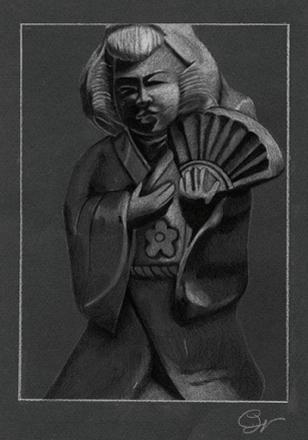
nobleness of life as an act of embracing love. He is caught up in the moment as he is entangled in the arms of Cleopatra.
Later on in the play, as a result of Caesar’s advice, Antony marries Caesar’s sister, Octavia. In a conversation with Octavia, Antony realizes that his reputation has suffered because of his “doting” actions, and once again redefines honor: “If I lose my honor, I lose myself; better I were not yours than yours so branchless” (III.4.23-25). Here Antony describes honor by the characteristics of a great Roman hero, as opposed to a great lover, and he can
no longer be Antony if he does not possess this quality. In this moment, Antony feels pulled toward the Roman conceptions of manhood and masculinity. During this time of war, he is called to play the role of a Roman general, which causes him to identify himself in this manner, or he would rather not exist at all.
Further in Antony’s discussion with Octavia, Antony reveals to her that he is preparing for war against her brother Caesar. When Octavia returns to her brother’s side, Caesar declares that Antony “hath given his empire up to a whore, who are now leaving the kings, th’ earth for war” (III.6.66-58). These two ever-contrasting Roman generals have now declared war against each other. Despite contrary interests, Antony decides to fight by sea “for that [Caesar] dares us to’t” (III.7.29). Antony, unable to get past this moment of pride, sends his army out into an anticipated defeat. While amidst the heat of the battle, Antony sacrifices his military position by unwisely allowing Cleopatra to determine his course of action, in which Scarus describes:
She once being luffed,
The noble rum of her magic, Antony, Clasps on his sea wing, and, like a doting mallard Leaves the fight in height, flees after her.
Experience, manhood, honor, ne’er before Did violate so itself (III.10.18-24)
Antony, due to his cowardly actions, realizes that he has offended his reputation and he has shamed his honor. In this moment of war, his reason was overcome by his emotions, an unrecoverable moment, in which Antony realizes his ideal identity of a Roman hero is lost.
Caesar, consistently being led by reason, sees this flaw in Antony that often causes him to allow his emotions to be ruled over his reason. After he discovers that Antony has fled the battle to follow Cleopatra, he says, “women are not in their best fortune strong, but want will perjure the ne’er-touched vessel” (III.12.29-31). While Antony feels that Cleopatra has the power to change him for the better, in contrast, Caesar only sees women as weak whether their fortunes are high or low. He lives his life based on the idea that power will always take precedence over love, and foresees that Antony’s authority will eventually collapse.
As Antony prepares to face Caesar in battle, he determines that he will “live, or bathe [his] dying honor in the blood shall make it live again” (IV.2.57). Here, in the onset of war, Antony links the notion of honor (masculinity), to that of death. He believes the act of death invests him with honor, the honor
which he feels he has lost. In death, Antony believes he is able to gain back his true identity as a Roman general:
Wherein I lived the greatest prince o’ th’ world, The noblest: and do now not basely due, Not cowardly put off my helmet to My countryman. A Roman, by a Roman Valiantly vanquished (IV.15.55-60)
Rather than amend his identity to accommodate the defeats he has faced, Antony chooses to take his own life, an act that he feels restores him to his brave former self.
Throughout the play, Caesar views Antony as a man whom he must “bear so great weight in his lightness” (I.4.24-25) that Antony’s “shames quickly drive him to Rome” (I.4.72-73). This representation of Antony is a pattern that persists throughout the play. Caesar is a character that evolves only around power, which is a representation that embodies the Roman concept of masculinity. While Antony continues to live moment to moment, he is the one who captures the audience amidst his struggle between reason and emotion, which makes him convincingly human. Antony, at a moment in which he has been left without his military position and his love for Cleopatra, cries, “Here I am Antony, yet cannot hold this visible shape” (IV.14.13-14). Antony realizes that he is not a man if he does not possess both his position as a Roman hero, and his position as a Roman lover. Therefore, he has lost his sense of who he really is. He is nothing without his reason and emotion both intact. In the end, Antony is ruled by his emotions just as much as his reason, and none is greater than the other.
—Letitia Erickson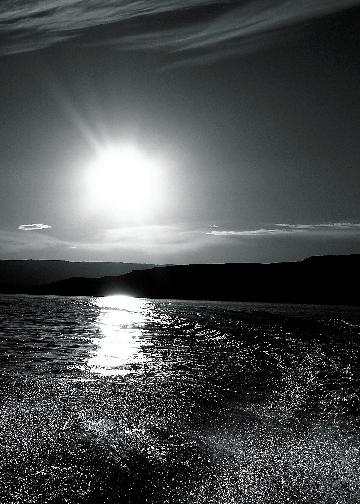
This is the last page, empty and free. It needs to be written on. A new song from my “heart’s mind”—remember that one? But I’m spent like juice. I poured myself out— more like a waterfall in a drought. Done for now, awaiting a new monsoon. The last one just ended. Except I can read it over and over if I wish— on another page—but this page is up.
It’s full of the repercussions of the new ended seasons rain; gone but lingering, still and fresh. I love that smell.
—Nathan Croft1. Comfort in Fashion by Polly Esther Cotton
2. Demon Cats by Iona Canary
3. This Thing Called Hygiene by Anita Bath
4. Fear of Food by Anna Recksieck
5. Antiques by Rick Eddie Tabel
6. Fabrication by Tex Stiles
7. Favorite Love Songs by Sarah Nade
8. Procrastination by Evan Chewelly
9. Wo Unto the Liar! by Ghotta Helen Frie
10. Safety First by Justin Kase
—Julie Rebecca ThorupUnder the apricot tree
Dimpled grass spreads
Patterned with holes
Made by fat, fallen fruit forsaken, forgotten and fading away Food for invisible appetites
—Julie Rebecca Thorup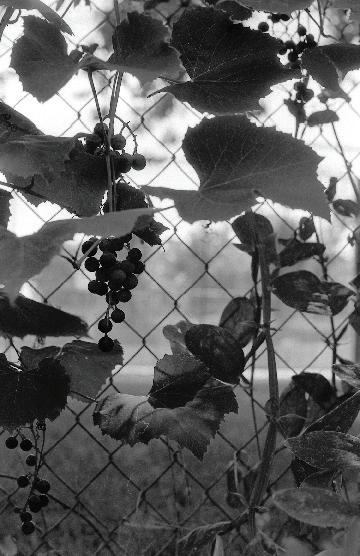
We poets are a funny class
We write of such things And cover every topic
Such as inspiration brings

How often we have written
Of the things we do not know As if we knew them all first hand
When only thoughts did flow?
Yes sometimes there’s a case
When we write the way we feel
From pure and true experience So genuine and real
How many of us have written out
Our hearts upon a page And rendered love so beautiful?
We’re infinite I’d wage
And yet how many times I think
Did that poem go unread, And we set it in a secret place
Till from our thoughts it fled?
Or did we spill our love out
For whom it was composed, But then we’re hurt directly Having left ourselves exposed?
How sad that we have written
Of the love we’ve never known
Or at least had it requited, Not, at least, that it was shown
How silly, as a child, I was
When I did such things as this I wrote a poem for kisses
When I’d never known a kiss
—Julie Rebecca ThorupI am sure that someone, somewhere, in the world is being sung to. Happy birthday as I feel like this. Somewhere a thousand friends join, solemn congregation as I sit here in lonely and chill contemplation. Somewhere a thousand brightly colored cancer curing wish granting paper cranes have been made. The intricate folds of someone’s time fused with love smelting care and a thousand candles lit to share alms for the trinity’s gaze, to clear the blaze of torrential pains like monsoon seasons of softball size salt solution cries. And there’s candles filling cathedrals ringing in the ears of the stained glass figures dancing, light bending triangles into vibrant stellar distortion of beauty that looks like the serene framework of chant. Candles lit for someone
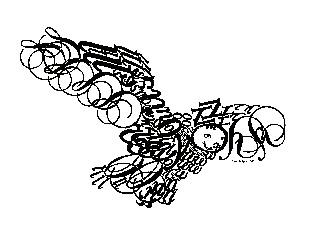
somewhere a thousand simultaneous somewheres. But this heart is lonely with the distant view; fleeting rays of white-gold through clouds that I love and I write for the angels above to see these broken tears below flowing like a Chinese river without lilies and glowing lanterns, but only chamomile tears and peppermint loss of dreams. Grim dejection like boarded up doors rusty nailed blocked always seems so inevitable like the opposite side of a broken bridge greener grass pasture grazing like eyes harvesting the blood red opening at the end of an October tunnel, like the waterfall set to sink childhood paper E-5
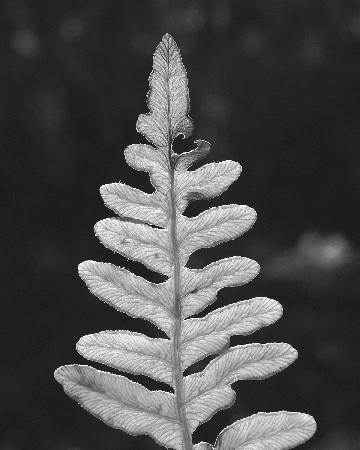
G-7 hit or miss battleships like the end that’s near, the end that always comes to everything, always too soon sensationally there looming like a thief behind your back waiting to reach his nimble claws to the butt pocket of life and rob from your sentimental billfold your only breath. Just the last feeble breath you had rolling off your lips at the edge of collapse but clinging like stale molasses to the bottom of the lid, leaving you sullen and hopeless. If only you could use more letters to spell out that you are sad but you’re much more than the two year old shallow water swimming orange bicep life vest yellow upside-down smiley. There is something more than that on both ends but nothing comes, no life ring deep depression preserver, it just rains and with every drop it drains you. A favorite air pouring like a bitter mug with two lumps of despair like you can’t get out like your Mount Everest frostbite claimed fingertips do nothing to help, just shout out and cry as loud as the pounding earthquake seismic sounding underground machine-gun thud. The rain seems to never dry the chamomile tears too hot to cry too hard to try like the energy is frozen tight in a cave lost in the mountains nearby, it’s a yearlong journey if not fatal, too hard to try to summon any ounce of power because it feels like all the I can’ts pile up like scrap metal haystacks, burying the needle of motivation. Doesn’t everyday at some time ask the unanswered why? And you feel as cold as the drowning starless blue above and…and…and what? And I feel like hell? And what, I have no one to tell but the skin on my back life-lashed ten too many thousand times so that all the reddened bleeding and slowly bruising lines start to rhyme reading down my college ruled flesh. Look that one spells “dad” and there, the broken abrasion seeping out the sadness within, burning like poisoned honey spreading right across my Orion’s belt and the Sagittarius falling apart because the cosmic dermis wounds never heal. It was never meant for a wooden boy to be real, but you are. You know because of what you feel. You seem to be red nosed and stranded on the island of misfit, unlegit, piece of shit toys, like someone is playing with your own soggy voice as it decays and sours like a sunken ship’s sail that will never catch the wind and fly
or ever hear the seagull say goodbye because the stern was yelling so loud and lightning was striking and arrogant and proud as you are, you’re the humblest star still shining but barely glowing inside. No nuclear fusion ideas or energy or courage or confidence aurora streaks the sky no running out of orbit you cower you hide like a soft spent white dwarf recoiling disgrace dimmed like Bigfoot being shaved, like the letdown of the playground being parking-lotpaved, recluse and hermit in a corner of the universe watching the interstellar chamomile rain, evaporated, saddened and condensed droplets of jewel sleepy bloodshot white incrusted tears the black and white prism reflection of recycled fears, cried, dried and cried again by the sky who took them from the ground after they fell from my eye and I hate this feeling and I never ask that freakish revolting vomiting why. I know there is no responding reply. No retort that really answers or counters the shy expression held back retentions, afraid the class will laugh away the only dumb question, the one not asked because no one really pays attention to pure wisdom tooth truth over brutality and social summer barefoot calluses because no one stands by to watch me die because everyone knows that wooden boys were never given the feather from the lucky stars above the true spell breaking kiss of pure first love under the full moon touching gently on the secret overgrown garden gate lake transforming enchanting royal scale piercing sword in dragon heartstring chest. No never ever land perfect ending story because sadly always after locked with no fairy godfather mafia, string pulling taking care of like Greek mythology godly family and forever in every castle’s tall tower broken roof leaking chamomile peppermint burning rain from dead unicorn bloodstained red battlefield kingdom come and gone clouds, never does anyone sing to a broken, splintering, and weathered by life’s racking pains and sorrows, creaking wooden bones, rusty screws barely moveable, wooden boy, because everybody knows wooden boys were never meant to fly.
—Nathan Croftlike Bigfoot being shaved, like the letdown of the playground being parking-lot-paved
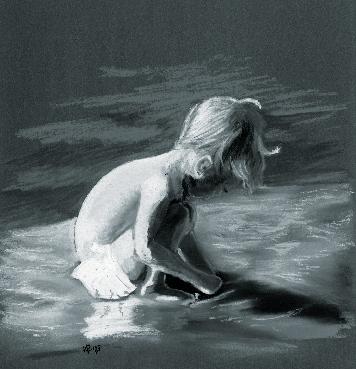
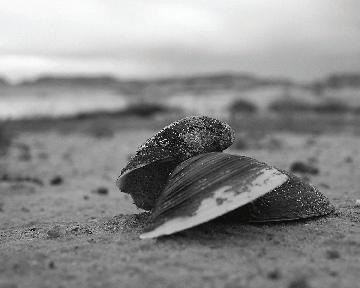
To the love that grows inside me, the love that knows no bounds.
To her that is meant for me, the one that fate has found.
I wait for her to hold me; to take me in her arms. Give me of her pleasures and bless me with her charms.
I’ll wait for her, my partner, the one who fills my dreams, who takes away the shadows and guides me with her beam.
I can wait for you my lover. I will hold my own last breath. With you I will discover that true love shall last through death.
—Francisco Vazquez III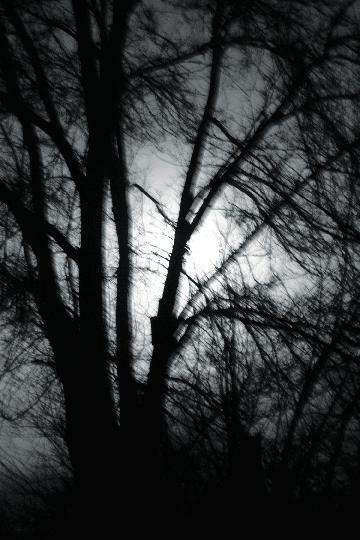
Once vibrant Aspens and Conifers beautifying my forest land lay strewn, broken by the destroyer whose cunning stole my placid gaze.
One conifer beautifies my spent land; token of devastation’s sad refrain. That cunning stole my peaceful gaze with no warning to deceiving ways.
So stands devastation’s sad refrain— now clear and heal the land’s despoilment. No known warning of deceiving ways could stop the traitor’s perilous hand.
Clearing and healing land’s despoilment from what previous joys had freely been, I’ll stop the traitor’s perilous hand— no more of spoilage to maim my being.
What present joys can now freely be! Go and forge that gorgeous oasis— no more of spoilage to maim my being, but new perpetual life springs rest.
New life grows—replacing the forest, earlier broken by the destroyer. Haven’s splendid garden replace once vibrant Aspens and Conifers.
—Laura MichieOne of the greatest misconceptions surrounding the work of Dr. Martin Luther King, Jr. is the belief that his struggle was solely for the benefit of the African American community. This misconception that the Civil Rights movement is a struggle for minorities is the likely reason that so many law makers, including legislators in Utah, resisted the creation of a holiday honoring Dr. King’s memory. This ignorance is disheartening because it diminishes the benefits all Americans have enjoyed as a result of the Civil Rights movement. Dr. Martin Luther King struggled to awaken America’s conscience; he struggled to bring truth to the promise of “liberty and justice for all.”
The United States was founded on the ideal that all men are created equal and endowed with certain unalienable rights. However, in practice we have been less than compassionate as a nation. Freedom can be a double-edged sword. On one hand, you can exercise your freedom to benefit all humanity. On the other hand, you are just as free to hate as you are love.
Unfortunately, in many parts of our nation, leaders took it upon themselves to weave racism and intolerance into the fabric of their communities.
The Constitution guarantees equal rights to all citizens, something that should have prevented racism from having the legitimacy of law. Unfortunately, in many parts of our nation, leaders took it upon themselves to weave racism and intolerance into the fabric of their communities. Segregationists took their personal prejudice and blended it into every public institution from schools to law enforcement. Communities all over the country had laws in place that denied American citizens their fundamental rights and kept the legacy of slavery alive. Dr. King worked to expose this injustice for what it was: a complete contradiction the spirit of our nation.
It was apparent that our government had to become involved to root out the destructive and divisive remnants of slavery that existed in our country.
The Civil Rights movement was not the sole creation of Dr. King, but he instilled into the movement the concept of non-violent resistance. It is a testament to Dr. King’s determination and strength as a leader that he could convince the very people most victimized by violence and blind hatred that using non-violence and having love in their hearts could topple the institutions of hate. The proud African American communities that were fighting for freedom from Montgomery to St. Augustine were subject to some of the most heinous acts of violence in an attempt to break their will. They chose to fight these attacks not with retribution but, as Dr. King called them, “creative weapons of love.” I find it miraculous that the participants in this movement could take their justified rage and change it into a positive force. I am sure this wasn’t an easy idea to sustain; many contemporaries of Dr. King felt a more militant approach was needed to counter the bellicose methods of their opponents. In retrospect, the philosophy of non-violence brought legitimacy to this battle. Had the participants resorted to violence, it would have discredited the movement as a race war.
The photographs and television images from the demonstrations showed the virulent anger that this movement was up against. It was obvious to all who witnessed the horrible reprisals their fellow Americans had to face as they exercised their rights, that this was wrong to the core. Justice may be blind, but thankfully she is not deaf. The cries for America to live up to its ideals were heard. It was apparent that our government had to become involved to root out the destructive and divisive remnants of slavery that existed in our country. Supreme Court decisions struck down one segregationist’s law after another as unconstitutional. This success caused the opponents of the movement to become more deadly, using bombing and assassinations in a desperate attempt to preserve the traditions of racism. These violent acts only served as the death throes of a monstrous creation that had lived too long. Not even the assassination of the man who proposed the Civil Rights Act, President Kennedy, could derail its passage into law.
The passage of the Civil Rights Act in 1964 was momentous, but certainly not the end of this struggle. Dr. King continued his quest to make, our country better. He fought the inequities of poverty. He fought for voters rights. He fought up until the day that a killer’s bullet robbed the world of this
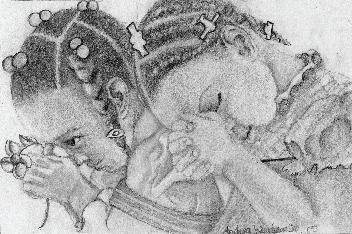
remarkable man, but the work of Dr. King continues to inspire. The Civil Rights Movement that exists today continues the spirit of Dr. King by shining a light into the places where inequality still exists. Had the groundwork not been laid by Dr. King and others, it would not only be more difficult to expose the inequalities in our society; it would be downright dangerous.
The sacrifices of Dr. King and his supporters have made the struggle for equality in America a more “civil” movement. Where injustice exists, citizens can speak out without fear. This was not the case during the fledgling years of the struggle; those who raised their voices in the call for justice were in danger from those who fought to deny justice. The enemies of the movement had a huge arsenal of intimidation at their disposal; intimidation though violence, through a corrupted police force, through the racist courthouses, and through the racist statehouses. The supporters of Dr. King only had righteousness and the “creative weapons of love” on their side, and yet they prevailed. Their victory rendered impotent those arsenals of intimidation. My right to have my voice heard had always been guaranteed by the Constitution, but it was the price paid by Dr. King that made it safe for all Americans to exercise their rights. The worst pain I need fear from those who disagree with me is the sting of their words.
Dr. King resurrected one of the greatest natural resources that Americans possess: our conscience. This part of us is awakened when America shows the true greatness of our nation, our compassion, our sense of justice, and
the realization of the ideal that all men are created equal. The greatest triumphs and tribulations of the Civil Rights Movement occurred during the 1960s. This fact creates a danger that the moral clarity bestowed upon our nation by Dr. King may become clouded by the passage of time and the complacency of our modern lives. This would be a great disservice to the values the Civil Rights Movement can bring into our lives. I was born many years after the death of Dr. King, yet I have been affected by him. The ideas I have been exposed to through his words have changed me in a meaningful way. I feel as if Dr. King has given me a valuable gift that I will always carry with me. I have a new vision, a new voice, and a new strength in my heart thanks to his legacy.
The perspective that Dr. King shared with all Americans is as relevant today as it was in the 1960s. It is highly unlikely that the proponents of bigotry will present themselves today in the white hood of the Klan. It is far more likely that modern day racists will be wrapped in a familiar disguise and march under a banner of national pride as they disseminate a more subtle message of intolerance and oppression. The inequality that still exists in our nation may not be as obvious as in the past, but by seeing our society through the unique vision of Martin Luther King Jr. it is much easier to recognize the mechanisms of oppression (no matter what disguises or false labels they wear).
Not all wars fought for freedom involve bullets and fighter planes.
Injustice has a myriad of forms from the mindless racism to the premeditated subjugation of others for profit. It is our duty to unmask these inequalities not only for ourselves but for the sake of our nation. Examining the agendas of the people who set national policy through the prism of Dr. King will prevent racism from finding its way back into the laws of this nation.
To truly honor Dr. King, we cannot allow injustice to exist unchallenged. Not all wars fought for freedom involve bullets and fighter planes. If we do not confront the domestic enemies of liberty, all the blood spilled on foreign soil in the name of freedom will be meaningless. This is why I will always be a willing recruit in the defense of civil rights. I will not be silent when I witness the ugly face of hatred, because when faced with injustice, it is not a crime to be unable to stop it but it is a grave sin not to even try.
The incredible sacrifice made by those in the struggle to make the United States a more just nation has filled me with gratitude and a sincere desire that the Civil Right Movement not be forgotten. My heart is stronger with the knowledge that righteousness can prevail against the entrenched forces of
racism. I know I probably can’t fix all of the transgressions committed against my fellow man, but I am certain that I am right when I follow the path set forth by Dr. King from one of his last sermons in Memphis:
“In the final analysis, God does not judge us by the separate incidents or the separate mistakes that we make, but the total bent of lives. In the final analysis, God knows that his children are weak and they are frail. In the final analysis what God requires is that your heart is right.”
—David Valla


The tenderness left him when his wife did.
And a soft bitterness quickly took her place. He left her toothbrush in the bathroom, but moved her plants to the porch, where when the deep cold came he was there to watch them die.
And as the night came they watched him back.
The dying, watching the dead.
He picked a spot close to her favorite orchid, pulled its painted pot close to his naked chest and whispered meaningfully to its crumpling petals:
“I was never young you know— at least not the way I wanted to be.”
He watched them until morning came, glad to have the cold’s bitterness ebb his own. He felt no guilt when he thought he heard them whimper. At sunrise he cracked his knuckles
Lit a Ligget (her brand), sucked deeply, exhaled forcefully and waited to be done with her. Sympathetically the seasons changed their order and winter took its turn twice.
It was years before he was young again.
—Jeff StinsonTo breathe the air of a distant shore, to walk a path not yet explored, to discover thoughts not yet found, and write the words that make a sound…
We probe the depths of the inner soul and rise above the fears of old. Seeking strength from passion’s fire we fill the world with hope and desire.
For a poet’s dream is never done, inspiration shall forever run. Through verse and virtue the world shall see a mind as powerful as could ever be.
—Francisco Vazquez III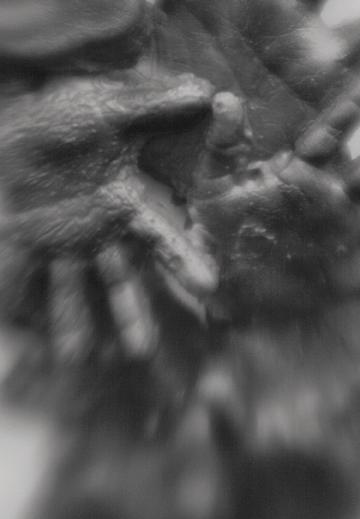
Folio: Redhanded Editor
J.E. Remy
Design Editor
Bradon Anderson
Folio Staff
Elizabeth Curtis
Justin Popa
Julie Thorup
Writing Center Liaison
Clint Gardner
Faculty Advisors
Melissa Helquist
Lynn Kilpatrick
Support Provided by the Department of English and the Student Media Council at Salt Lake Community College
The Globe Media are open campus forums, and we encourage written expression of diverse points of view. Opinions expressed in Folio do not necessarily represent the views of Salt Lake Community College, the Student Media Council, or the Globe Media. Please send all submissions to folio@ slcc.edu. Final publication decisions rest with the editors of Folio.
Each author/artist retains copyright individually.
Folio
A Literary Magazine
Salt Lake Community College
Volume VII Number 2
Fall 2005
Cover Art
“Redhanded” by Brittney Montgomery
Contest Winners:
“How the Work of Dr. Martin Luther King Jr. Has Affected My Civil Rights Today” was the winner of the 2005 Salt Lake Community College Martin Luther King Jr. Celebration Essay Contest. For his efforts, David Vala received a $100 gift certificate from the Salt Lake Community College Bookstore, a Fall 2005 tuition waiver from the Vice President of Academic Services, and publication in Folio.
“Lady Anne’s Journal” by Haylee Bradfield, “Othello’s Sonnet” by Blake McGillis, and “Reason vs. Emotion” by Letitia Erickson were winners of the 2005 Salt Lake Community College Shakespeare Writing Contest sponsored by the SLCC English Department. For their efforts, they received publication in Folio.
Editors’ Note
The editors would like to thank all those who have helped in the development of this edition of Folio. We’ve worked hard to take the best of previous editions while developing a look and style that raises the bar for future volumes.
It is with great pleasure that we are able to present the poetry, prose, art, and academics incuded within this book. We hope you enjoy reading and viewing each piece as much as we have.
—J.E. Remy & Bradon Anderson
You spent all that time perfecting your work and now it’s a stack under your bed. Peel away the cobwebs and blow off the dust. It’s time to get it published.
Authors submit poetry, drama, short stories, essays and academic works (3000 word max.) in Microsoft Word. Artists submit photography, illistrations, drawings, paintings, computer graphics, etc. in e-mail (300 dpi, CMYK format).
All entries need to be sent to:
folio@slcc.edu
Please remember to include your full name, phone number, and e-mail address and title of the work with your submission. Submissions will not be accepted without this information.
Deadline for submissions is February 20, 2006.